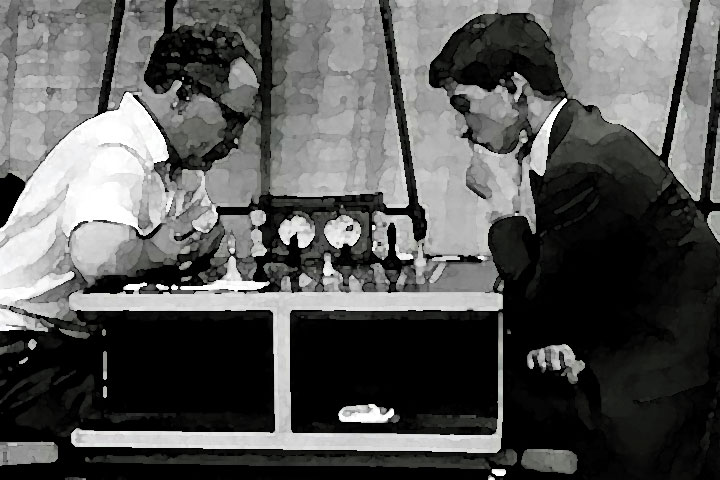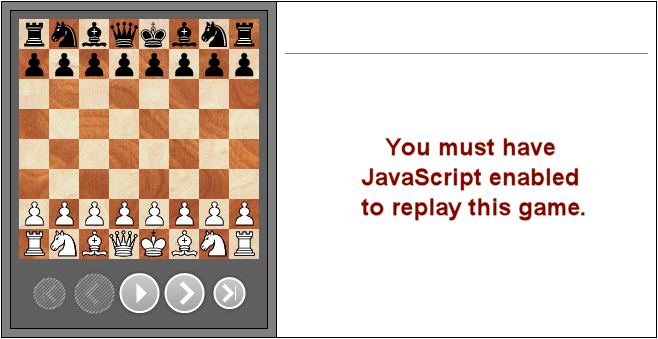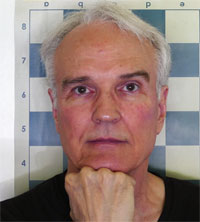


ChessBase 17 - Mega package - Edition 2024
It is the program of choice for anyone who loves the game and wants to know more about it. Start your personal success story with ChessBase and enjoy the game even more.
 Bobby Fischer's encounter with Mikhail Botvinnik made the cover of Chess Life (October 1962). In Fischer's My 60 Memorable Games it is number 39 and gets 14 pages of notes and analysis.
Bobby Fischer's encounter with Mikhail Botvinnik made the cover of Chess Life (October 1962). In Fischer's My 60 Memorable Games it is number 39 and gets 14 pages of notes and analysis.
The game almost did not take place, since the Soviets considered "resting" Botvinnik in the round against the US. But then he did turn up and the world was treated to a truly exciting game. In Fischer's My 60 Memorable Games, p.240, GM Larry Evans writes:
"Walking into a prepared variation, Fischer promptly refutes it. But, instead of nursing his winning advantage, he simplifies too quickly and reaches an adjournment where victory is problematical. After a sleepless night of analysis, Botvinnik finds a stunning defense. Fischer engages in a seemingly harmless transposition of moves (51 . . . P - QN4), and falls into a pit—throwing away the win he maintains was still there. – Evans, in In Fischer's , p.240.
The deep endgame has been discussed in many sources since then. But it seemed that it had not given away all its secrets yet. The most difficult question, was if 44...Kh6 wins. For this there had been no convincing winning proof. This has changed – with the help of our readers we now know the answer.
Basically all analysts had agreed early on the following points:
Here are the incredibly deep analyses of all three main contenders for our prize:

 You probably know that in our replay boards there are a large number of functions you can use to really appreciate the games. Recently we published a comprehensive tutorial on how to get the most out of the live broadcast game viewer. Learn about all the powerful features and buttons that make the ChessBase's replay one of the best watching experiences around.
You probably know that in our replay boards there are a large number of functions you can use to really appreciate the games. Recently we published a comprehensive tutorial on how to get the most out of the live broadcast game viewer. Learn about all the powerful features and buttons that make the ChessBase's replay one of the best watching experiences around.
One big advantage is that you can start an engine (fan icon) that will help you to analyse. You can get multiple lines of analysis by clicking the + button to the right of the engine analysis window. The "!" key, incidentally, shows you the threat in any position, which is incredibly useful in the case of unclear moves.

There is one more thing you can do. It is a lot of fun, but also a serious challenge: Click on the rook icon below the notation window. This will allow you the play the above position against Fritz, at your level of playing strength (e.g. "Club Player"), right here on the news page. Note that your analysis, in which you can delete, move or promote lines, is stored in the notation as new variations. In the end you will find the game with your analysis in the cloud. So nothing is ever lost.
 My congratulations to Charles Sullivan for winning the competition! Charles, who is 71, grew up in the San Francisco Bay Area. While at the University of California, Berkeley, he was captain of the golf team, marched with the Cal Band for one year, played trumpet in the concert band, and was tear-gassed by helicopter during the People's Park demonstrations in 1969 (it was a weird time). He taught elementary school for three years (his hardest job ever) before switching to computer programming until retirement. A favorite memory is playing chess while sitting on the steps (which was allowed in those days) of the Parthenon in Athens in 1973. Today he lives with his wife in Davis (near Sacramento).
My congratulations to Charles Sullivan for winning the competition! Charles, who is 71, grew up in the San Francisco Bay Area. While at the University of California, Berkeley, he was captain of the golf team, marched with the Cal Band for one year, played trumpet in the concert band, and was tear-gassed by helicopter during the People's Park demonstrations in 1969 (it was a weird time). He taught elementary school for three years (his hardest job ever) before switching to computer programming until retirement. A favorite memory is playing chess while sitting on the steps (which was allowed in those days) of the Parthenon in Athens in 1973. Today he lives with his wife in Davis (near Sacramento).
 As Alberto Oggero gave the first deeper analysis with the right conclusions, I have decided to make him co-winner. Alberto is from Turin, Italy, a chess player (Elo 1800) passionate about the chess engine world in particular. A few years ago he wrote a Montecarlo analysis tool program downloadable here (the program works only on old Win XP). He also participated in the online freestyle tournament with Rybka under the nickname Albitex. Carlos often publishes articles and reviews on the Italian forum for chess engines (Albitex nickname).
As Alberto Oggero gave the first deeper analysis with the right conclusions, I have decided to make him co-winner. Alberto is from Turin, Italy, a chess player (Elo 1800) passionate about the chess engine world in particular. A few years ago he wrote a Montecarlo analysis tool program downloadable here (the program works only on old Win XP). He also participated in the online freestyle tournament with Rybka under the nickname Albitex. Carlos often publishes articles and reviews on the Italian forum for chess engines (Albitex nickname).
Zoran Petronijevic also supplied convincing proof. But as he has won the first competition I suggest to give him an honorary mention. Many thanks to the analysts! If you have further comments please send them to my email address.